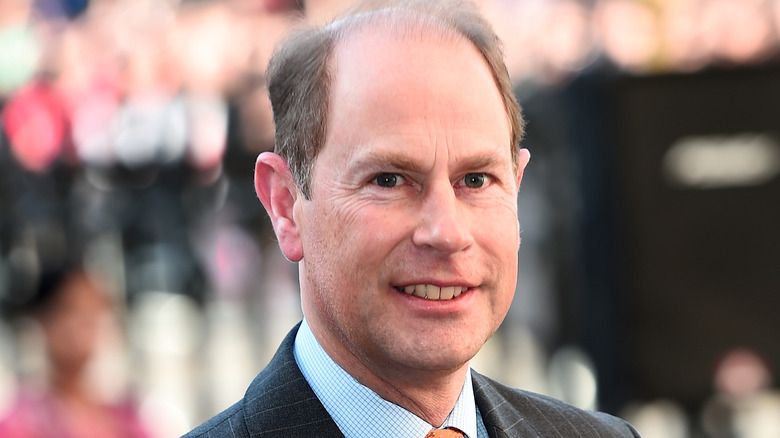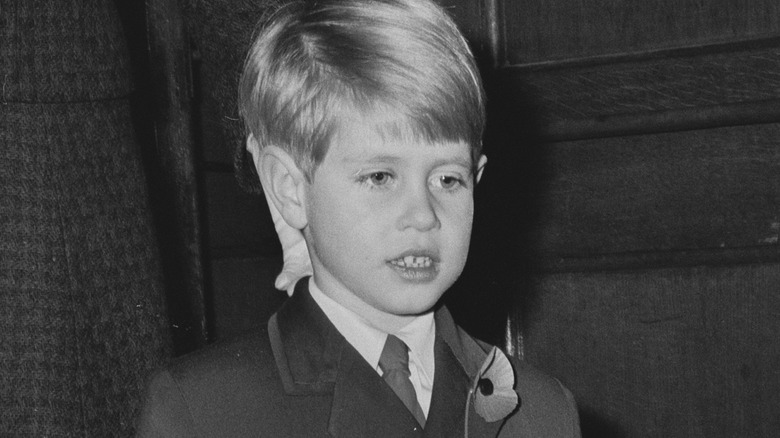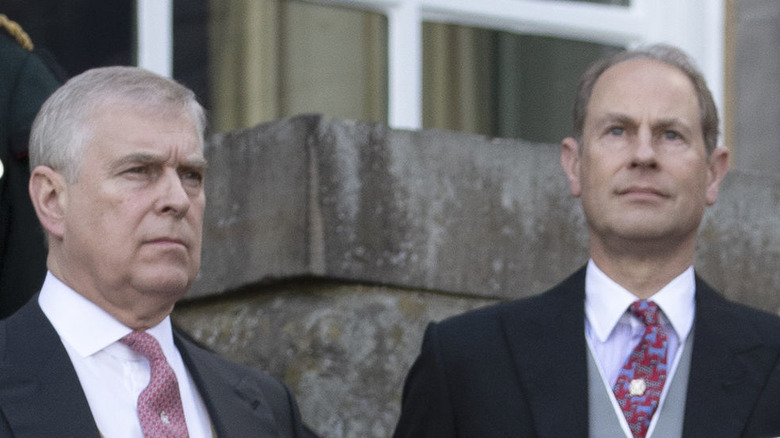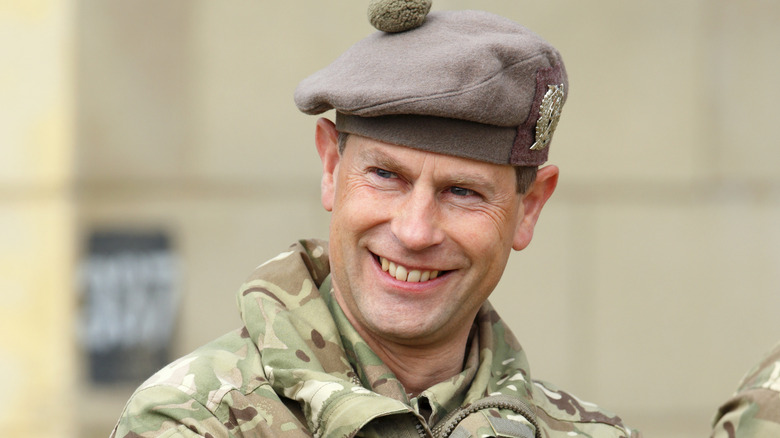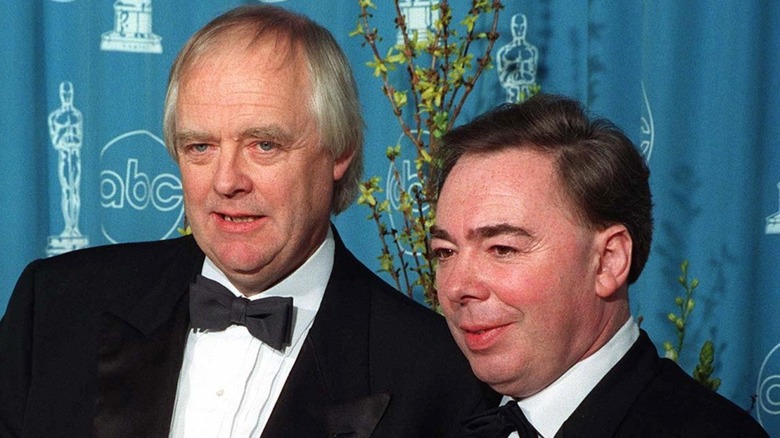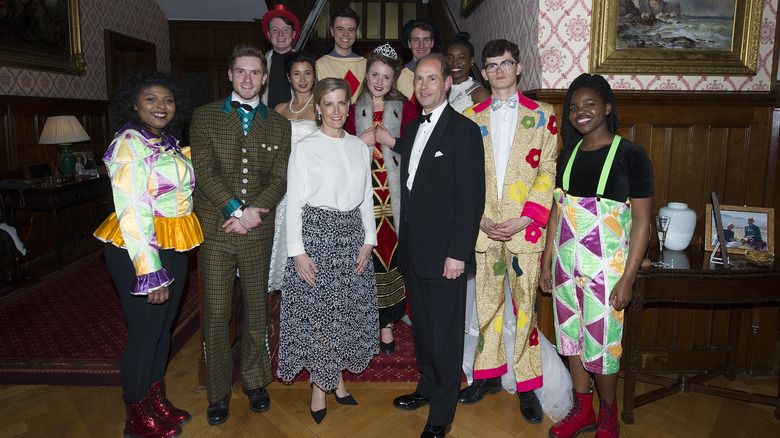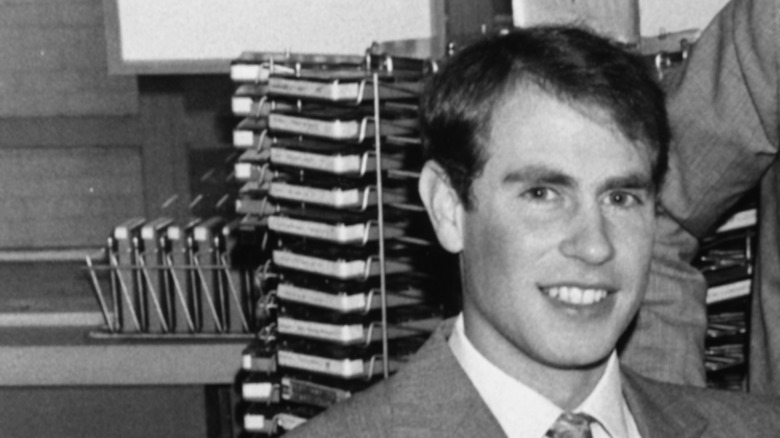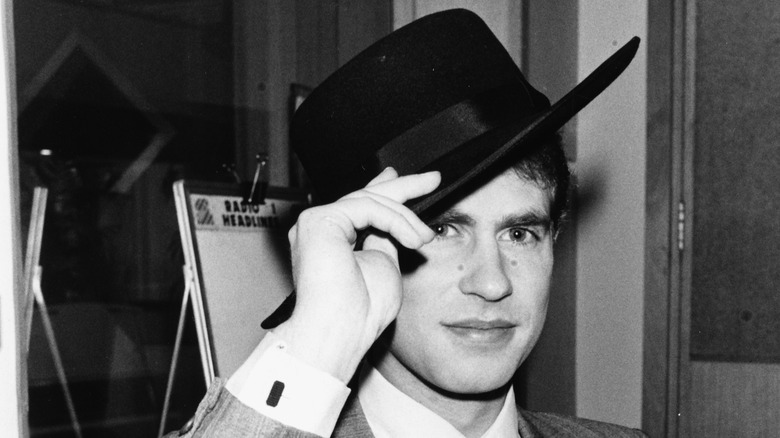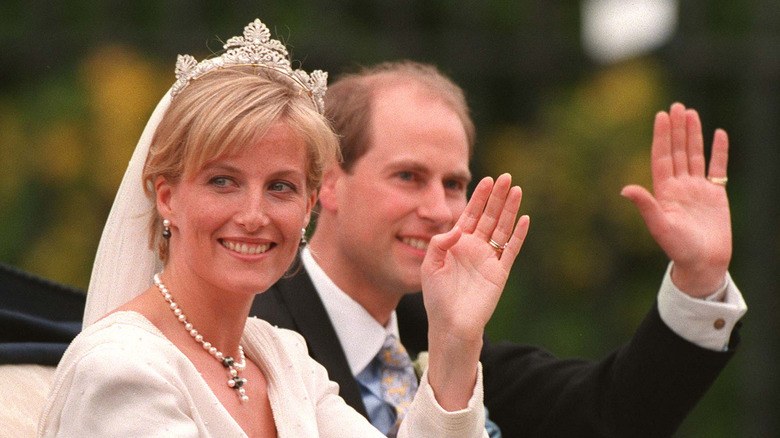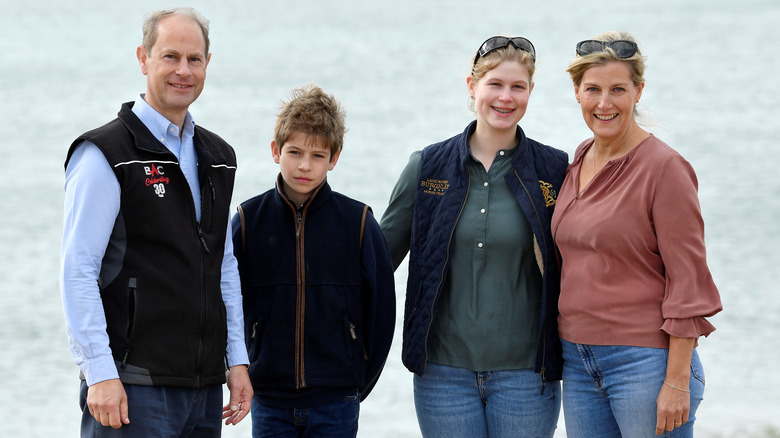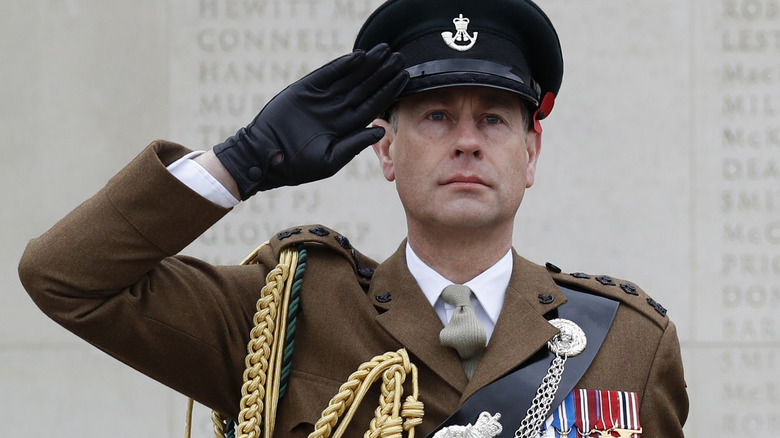The Untold Truth Of Prince Edward
As Queen Elizabeth II left Westminster Abbey for the final time on September 19, 2022, her coffin was followed in the procession by four somber figures. They were her children, coming together to pay their last respects. There was Charles, king after 70 years spent as heir to the throne; Anne, Princess Royal, known for her charitable endeavors and sharp tongue; Andrew, Duke of York, temporarily recalled to public life despite the allegations of sexual misconduct against him; and then there was Edward, Earl of Wessex, the youngest child of Elizabeth and Prince Philip.
Edward hasn't reached the same levels of fame (or notoriety) as his siblings in his 58 years, but he has been a presence in British media and public life since reaching adulthood. In the course of his life, he's gone from third to 14th in line to the throne, picked up a second earldom (of Forfar, for use in Scotland according to Town and Country Magazine), and taken over most of his father's responsibilities for the Duke of Edinburgh's Award according to Royal.UK. He's also garnered respect for his efforts to make a living as a private citizen, the first child of a British sovereign to do so per Britannica. Here are a few things you may never have known about Prince Edward, Earl of Wessex.
He was the only child Philip saw born
Prince Edward was born on March 10, 1964. He was the third son and youngest of the four children born to Queen Elizabeth II and Prince Philip. According to Ingrid Seward's "Prince Edward," he was the only one of the four who Philip was present to see born. It's worth remembering that men were kept out in the waiting room for much of the 20th century. It was only in the late 1960s that they started to be a regular presence during labor (per NPR). The women's magazines Elizabeth read were slightly ahead of the curve on fathers being around for childbirth, and it was by the queen's invitation her husband was around.
As the baby of the family — 16 years younger than Charles III — Edward's upbringing was less bound by royal protocol. The queen dubbed Andrew and Edward her "second family" (per Seward) and saw them as a chance to play a more intimate role in their upbringing than convention and duty allowed her with Charles and Anne. She was so determined in this that she adjusted the timing of her weekly meetings with the prime minister.
Per Biography, Edward was inclined toward solitude and books as a child. Seward quotes the Queen Mother as saying of him, "I've never known a child sit so still." On the other hand, "Sophie's Kiss" (via Vanity Fair) reports that Edward showed "startling arrogance and petulance" when he was a kid.
He was bullied by Prince Andrew
Rumor has it that Prince Edward was Elizabeth II's favorite. Royal biographer Matthew Dennison endorsed the claims in his book (via Woman and Home), and went further in saying that Edward was the favorite of Prince Philip too. Others hold that the darling of the family is Prince Andrew. These are all allegations to be sure, and no one from the royal family is about to comment one way or the other.
However, there seems to be more solid ground for reports that the younger Windsors sometimes butted heads as children. According to Ingrid Seward's "Prince Edward," the boys had different temperaments. Andrew was a rowdy mischief-maker, while Edward was a bookish and well-behaved sort. The older Andrew would sometimes set his brother up to pull pranks or break rules for his own amusement. He was also a bully, swiping food and delivering kicks to Edward when the nanny's attention drifted elsewhere. Perhaps this acting out was compensation: Baby brother Edward was so well behaved that Andrew's antics looked all the worse by comparison. On the other hand, Seward claimed in another book (via the BBC) that Andrew bullied everyone.
The two princes weren't without common ground. They shared and loved a pony, Valkyrie. Edward liked to ride it while Andrew liked to groom it. Nursery staff compared their relationship to Laurel and Hardy, and one later said: "they got along fine, but they are just two totally different people."
He dropped out of the Marines early
While it isn't a necessity that male members of the royal family serve in the armed forces, it's a long tradition that princes do so. Edward, according to Ingrid Seward's "Prince Edward," had no thoughts beyond tradition after coming of age, and only dithered over which branch of the forces to serve in. After an officers assessment course, he settled on the Marines and went to Cambridge on the sponsorship of the Royal Marines University Cadet Scheme. In exchange for their paying his way through university, the expectation was that Edward would serve with them for five years.
The prince began his studies in 1983 and finished within three years. In that time, his contact with the Marines was minimal. He might visit a regiment on the weekend or undertake a training course, but he wasn't ensconced in military life. By the time he finished university, Edward had thoughts about life beyond the rote of his family, and any interest in a career with the Marines was gone.
Edward gave the Marines less than four months of the five years intended, per the BBC. "Everything that had been planned for me ceased," he told Seward (via "Prince Philip Revealed"). "The railway tracks were there and I was trundling down them ... then suddenly I had actually gone off the tracks." Rumor held that his war hero father Prince Philip was furious, but letters leaked to the press showed more understanding than ire.
He commissioned a musical for the Queen's birthday
Prince Edward has always been an enthusiast of theater. According to the BBC, he took a shine to media outlets from the get-go, carrying a radio set everywhere and indulging his book habit. But acting and stagecraft proved his best subjects when he was a student at Gordonstoun in Scotland, and he continued to take part in school theater when he attended Cambridge.
Many children have wanted to share their passions with their parents. At 22, Edward decided to do just that, using his theater talents for his mother's 60th birthday. His birthday present would be a musical. And, being a prince, Edward could do a little more than put on a one-man show. Per John Snelson's "Andrew Lloyd Webber," the queen's birthday show was penned by Andrew Lloyd Webber and Tim Rice on the commission of the Earl of Wessex.
The show they came up with was titled "Cricket," and a private performance was given for the queen at Windsor Castle on June 18. The plot concerned romances on the cricket field. After serving as a birthday present, "Cricket" performed at the Sydmonton Festival and the Lord's Taverners and got a warm reception. Rice was interested in expanding it. But according to Stephen Citron's "The New Musical," Webber's recycling of music from "Cricket" on other projects killed such possibilities and greatly upset his partner.
He worked for Andrew Lloyd Webber
After abandoning his career path with the Royal Marines, Prince Edward opted to pursue his passion for theater. He was the first senior member of the royal family to try and earn a living in the private sector, according to The Guardian. As a schoolboy, Edward enjoyed acting, but by the time he reached adulthood, a role out on the stage seemed wrong for him. Besides security and publicity concerns, "[Edward's] acting had become too amateurish," wrote Andy Beckett in The Guardian. "He liked to shout his lines and run about on stage a lot."
But there's more to theater than performing, and Edward remained enchanted by it. "I love the razzmatazz of show business," he said in 1987. "It's a wonderful world of fantasy and make-believe." After commissioning the musical "Cricket" from Andrew Lloyd Webber, Edward went to work for the composer, albeit indirectly. He took a job at Webber's Really Useful theater company as an entry-level production assistant, according to the Los Angeles Times. His responsibilities ranged from lending the production manager a hand to making tea.
Edward's tenure at Really Useful was short. In 1990 (per the BBC), he and some cohorts went into show business for themselves with their own theatrical company. As an aspiring producer, the prince went by Edward Windsor rather than his royal title. But putting on shows is easier said than done, and in 1991, Windsor's company folded with nearly $1 million in debt (per Britannica).
His attempt at a family showcase on TV was a disaster
Theater has a magic all its own, but film and television offer bigger audiences to aspiring producers. After putting together charity events at Cambridge, Prince Edward started taking television seriously as a career path alongside theater (per The Guardian). Almost as soon as he was out of university and his brief royal service, he committed to producing a special episode of "It's a Knockout."
"It's a Knockout" was a game show in which two teams competed in silly tasks. Edward's proposed episode, informally known as "It's a Royal Knockout," featured himself, Princess Anne, Prince Andrew, and Sarah Ferguson leading teams of celebrities in a charity competition in full Elizabethan costume. Singer Toyah Willcox claimed (via YouTube) that Princess Diana was willing to participate as well, but was banned by her then-husband Prince Charles. Elizabeth II and all her counselors thought the program a mistake too, but the queen was unwilling to damper her youngest son's enthusiasm, according to PBS.
Willcox felt that "It's a Royal Knockout" went well, at least on the day of filming, but that Edward erred in keeping the press at arms' length. Others found his reaction to their muted assessment (via YouTube) petulant and arrogant. The overwhelming consensus in the media was that the program was a disaster for the royal family, even as Edward kept hyping it. But as a charity event, it did bring in more than $1 million (per Grazia).
Ardent Productions
After a short-lived effort as a theatrical producer in the early 1990s, Prince Edward was advised by his father Prince Philip to become an accountant (per The Guardian). Instead, Edward consulted with entertainment broker Malcolm Cockren on the possibility of working in television. Cockren advised that, in order to avoid conflict between the royal family and potential employers, Edward should establish his own production company. (He also explained the myriad of issues with trying to make it in TV.)
The two men decided it was worth trying, and they launched Ardent Productions in 1993. Edward set up shop in central London, recruited respectable TV veterans, and put in enthusiastic hours. But his timing was inauspicious. Commercial TV was on the decline in Britain in the '90s. Many of Edward's peers rooted for his failure. And Ardent could never settle on what sort of programming it wanted to produce. It became dependent on American audiences eager for royal documentaries, which Edward initially opposed making.
Ardent was also behind a minor spat within the royal family when a camera crew was dispatched to St Andrews University in 2001, violating privacy guidelines around Prince William, who was then attending. After issuing an apology, Edward stepped down as the joint managing editor of Ardent (per the Telegraph). The company folded in 2009. Over $2 million was invested into Ardent during its lifespan, including more than $300,000 of Edward's own money. When all was said and done, less than $50 was left.
He's the only one of the queen's children not divorced
Prince Edward's theater and television endeavors didn't reach the level of success he may have wanted, but his private life has been another story. Town and Country Magazine noted in September 2022 that Edward was the only one of Elizabeth II's children who has never been divorced. He and Sophie Rhys-Jones have been together since 1999, and Sophie has been reported as a favorite of the late queen and Prince Philip according to the Times.
She and Edward met in 1993 while shooting promotions for the Prince Edward Summer Challenge, a charity game of real tennis. Tennis became their first date, according to Vanity Fair, and the prince was so charmed that he began calling Sophie at her job under the name "Gus." Working in public relations, Sophie took the following years of tabloid gossip regarding their romance in stride. Their wedding at St. George's Chapel, with 8,000 guests watching live by invitation, was considered modest by royal standards.
Not long after becoming a member of the royal family, Sophie became embroiled in a minor scandal when undercover reporters from News of the World recorded her and a PR colleague's unguarded comments in a meeting (per The Guardian). She stepped down from her job shortly after and joined Edward in seclusion at Bagshot Park. In 2007, they began working as full-time royals, a role in which they've become increasingly prominent and popular.
He and Sophie have struggled with pregnancy
Prince Edward's marriage to Sophie Rhys-Jones has been long and happy, but the couple's efforts to start a family after their marriage were troubled. Sophie became pregnant in 2001, but it was an ectopic pregnancy. According to the BBC, Sophie had to be airlifted to King Edward VII Hospital to have the fetus removed. Had the condition been undiagnosed, her life would have been in danger.
Two years later, the couple was expecting again. This time, they would have a child, Lady Louise. But Louise's birth would have complications of its own and she was born a month early after a placental abruption forced an emergency Caesarian section (per the Times). Edward was on an official engagement in Mauritius at the time (per the BBC), but Elizabeth II paid Sophie an unusual visit at the hospital.
Sophie became pregnant again in 2007 — this time without complications. Her son, James, was born on December 17, and he was given the title of Viscount Severn, according to the BBC.
He's the only brother without a dukedom
Compare the list of titles held by Elizabeth II's three sons, and you'll notice that one is not like the other. Before becoming king, Charles III was Prince of Wales, Duke of Cornwall, and Duke of Rothesay, per the Prince of Wales website. He also briefly held the title of Duke of Edinburgh after Prince Philip's death, according to the College of Arms. Prince Andrew remains the Duke of York, though he lost many of his titles after the sexual assault allegations were brought forth against him, per the BBC. But Prince Edward has no dukedom. He is known as the Earl of Wessex and, as of 2019, the Earl of Forfar in Scotland (per Royal.UK).
A duke is the highest rank in Britain's peerage system, while an earl is the third (via Historic UK). Edward's holding a lower rank is apparently his own choice. Per the Telegraph, he could have been the Duke of Cambridge instead of Prince William, but he liked the sound of "Earl of Wessex" when he heard it in 1998's "Shakespeare in Love" and asked Elizabeth II to name him earl instead.
However, Edward may come into a dukedom in time. The Sunday Times claimed in 2015 that he would become the next Duke of Edinburgh after his father's death. The title passed to Charles instead, but upon Charles becoming king, it merged with the crown, and it could be awarded to Edward at a later date.
If you or anyone you know has been a victim of sexual assault, help is available. Visit the Rape, Abuse & Incest National Network website or contact RAINN's National Helpline at 1-800-656-HOPE (4673).
